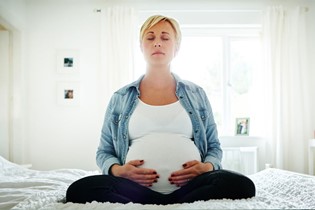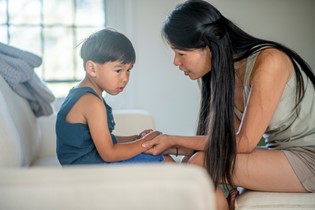Fertility expert's most-frequently asked questions

Our fertility expert Dr Richard Fisher has been helping New Zealand parents for more than two decades. But many of the questions he's asked about fertility and treatment have changed surprisingly little over that time. Here are some of his most frequently-asked questions.
For over 20 years now, I have written and spoken widely about reproductive medicine and getting pregnant. Despite this, and the efforts of many of my colleagues, I am continually surprised by our failure to have significantly improved the public knowledge about fundamental aspects of what we fertility specialists actually do. The questions I have been asked at Fertility Associates haven't really changed substantially in more than a decade. Here are some of the questions I often answer in my work.
Q: Do I need a referral to see a fertility doctor?
A: I think it is important that your general practitioner is aware of what is happening in your healthcare. Having a referral often means your first consultation with some initial results will be more useful than it might otherwise have been. Many couples initially like to make an enquiry without involving their GP and self-refer to fertility clinics. You should come armed with as much information about your health status as you can. At Fertility Associates it is our practice to seek your consent to send a copy of the letter we would normally write at the end of the consultation to your GP, to keep him or her informed. Although couples often wish to keep fertility issues private, there may well come a time when the involvement of your GP is important.
Q: I would like to have twins. Can you help?
A: Fortunately, most women who conceive twins have normal outcomes. The incidence of miscarriage and premature labour, however, is considerably increased. The incidence of congenital abnormalities and the potential for long-term ill health is also increased. Conceiving twins by accident is an unavoidable risk which can usually be managed successfully. Conceiving twins by design is not something you should ever plan to do.
Q: I am 42 and have been trying to have a baby for two years. What are the options available to me?
A: As you get older, your chance of conception year by year, and month by month, declines significantly. At 42, your chance of having a baby is around 4% each month. Although it is entirely possible you have not conceived yet by chance alone, it certainly is time you had your fertility assessed. You should ask your GP to refer you to a reproductive medicine specialist, where you will be given an assessment of your chance of conception as well as some suggestions about potential treatments.
With regard to age, my view is you should try to conceive as soon as you are able and certainly no later than your mid-thirties, if possible. If, however, you cannot start trying until much later, then you should present early for an assessment of your fertility and a discussion about options for potential treatments. Many women will still be able to achieve pregnancies in their early 40s, but you don't want to leave it to chance.
This doesn't mean you necessarily will need treatment, but a clear understanding about options and when they might be appropriate would seem wise. Traditionally, it was said that the definition of infertility was not conceiving after a year of unprotected intercourse. I think this is a particularly stupid definition in a practical sense, because if you are young, then you should have conceived well before a year if everything was normal, and if you are older, you don't have time to wait that long.
If you want to look more closely at the effect of age on fertility, check out the Biological Clock at www.fertilityassociates.co.nz. This device tells you your chances of having a baby each month at any particular age, and our opinion about when you should seek advice about options in the future.
Q: I have a three-year-old and have been trying to get pregnant again for the past 18 months, without success. What should I do?
A: Getting pregnant easily the first time sets you up for real disappointment and anxiety if it doesn't happen quickly again. Your previous pregnancy doesn't really change the rules about when you should seek advice, as there are many things that might limit your chance of conception (a man with a low sperm count is perhaps the most common).
If this is the case it is quite possible to have achieved conception by very good fortune the first time and still not be pregnant after a long time of trying after that. The decision about when to seek help or intervention shouldn't really be different if you have already been pregnant. Fertility is all about chance. It's important to understand how long "normal" is because quick conception the first time doesn't prove that you are very fertile.
On average, it takes a 27-year-old about four to five months to conceive but a 37-year-old will take around eight to nine months. At age 40, only 60% of women will have conceived by the end of the year, and sadly, around 40% of these cases will miscarry.
Q: I am 42 and have had a vasectomy. I now have a new partner who would like to have a child. What can I do?
A: Unfortunately, in the rush to become world leaders in vasectomy as permanent contraception, we in New Zealand seem to have forgotten that reproduction in second relationships is a very common desire. For 20 years, gynaecologists have taken great care in their counselling and advice to women seeking permanent contraception, and the incidence of tubal ligation has declined markedly. Sadly, it seems little thought goes into the counselling of men seeking vasectomy. Neither tubal ligation nor vasectomy should be viewed as potentially reversible procedures, as outcomes are unpredictable.
It is very important that discussion on vasectomy reversal looks at the likely fertility of the new partner. It saddens me greatly to find couples coming to see me where a man has had a vasectomy reversal and his new partner has significant fertility issues which should have been recognised before the decision for reversal was made. Vasectomy reversal is not just an issue of plumbing. The length of time between vasectomy and reversal is an important factor in
outcome, as is the method of original vasectomy. In my view, vasectomy should never be a "walk in, walk out" procedure without consultation with both partners, and an enquiry as to the stability of that relationship. Fortunately, there is good non-permanent contraception available to most couples now, which means that permanent contraception should never take place under any sort of duress. For many couples, IVF might be a better treatment, with a better chance of success in a shorter period of time, than vasectomy reversal. If a vasectomy reversal is chosen, an arrangement should be made to store sperm collected at the same time, just in case the reversal fails and IVF is necessary later.
A request for vasectomy reversal is a good example of how reproductive medicine often requires the skills of more than one person to make an assessment and to treat infertility, and why, in most circumstances, a fertility clinic is the best place for this to occur. Clinics have the resources of clinicians with a particular interest in this area, scientists who can assess sperm function and store it, and the availability of counsellors for those diffcult decisions that need to be made.
Q: I am single and in my mid-thirties. Is there a way to assess my future fertility?
A: There are good tests to assess the number of eggs you have, but without more complex investigations, it is difficult to know what your chance of pregnancy would be. The Anti-Mullerian Hormone (AMH) test can predict whether you are likely to continue to ovulate for as long as most other women, and therefore be in with a chance at least. This test is currently not funded and is available only in main centres.
It's a useful test, however, for younger women who are thinking of deferring conception for some time. If the AMH is low (fewer eggs than you would expect), then it can perhaps alter the time in which you might think getting pregnant is sensible. It is not much use getting your life organised both professionally and socially, and then finding that you are in the unfortunate position of having many fewer eggs than you would expect. The prospect of freezing eggs in younger women is now a real option, but I don't think it should be undertaken lightly on the off-chance that there might be a problem in the future. However it can certainly give some comfort to single women whose reproductive clocks are ticking faster than they would wish.
Q: I am overweight and can't get pregnant. I realise I need to lose weight, but would really like to get pregnant now.
A: The issue of weight and conception is now a real problem in reproductive medicine. As women become more overweight, their fertility declines. If you are overweight or obese, your risk of miscarriage increases. If you are bigger when you conceive, the risk to your child of later developing metabolic illnesses, such as diabetes, also increases. Having a body weight which is as near to the normal range for your age and height as possible is a really important goal before conception.
Even losing a little weight can make women who don't ovulate produce eggs, and those who do ovulate but can't conceive become pregnant. For many years, the focus in reproductive medicine has been on women who are underweight. The effect of obesity on conception, miscarriage and child health is now front and centre of research and treatment in the field. Perhaps the most important developing information is around the potential long-term health effects on children born to overweight women. You owe it to your children to be as fIt and healthy as you can be at the time of conception.
Q: Is sex selection available at your clinic?
A: The Human Assisted Reproductive Technologies Act in New Zealand makes it illegal to offer sex selection in this country.
Visit www.fertilityassociates.co.nz to find out more about fertility and treatments.
We have more information about infertility here

AS FEATURED IN ISSUE 13 OF OHbaby! MAGAZINE. CHECK OUT OTHER ARTICLES IN THIS ISSUE BELOW














